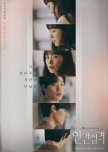
Tedious, Ponderous, Pretentious
There is no message here. Just vapid, bumper-sticker platitudes posing as poetic depth. For instance, a character says, "Youth is as lonesome as growing old," and yet neither he nor the show gives any explanation or insight as to why this should be true (in fact, it's flat-out untrue, because more elderly statistically live in isolation). The show's full of these bumper-sticker platitudes. But that's when someone in the show is actually speaking, rather than staring into space in utter silence.The director seems to think that a character silently staring while another character is speaking to them, is tantamount to depth and meaningfulness. Indeed, a good 6 hours of this 16 hour show could have been cut simply by deleting all scenes of characters silently staring into space . Characters ask another character a question, and the other simply does not reply but, rather, stares silently. If someone failed to reply to my questions as often as the characters in this show do, I'd slap them.
When it's not utter silence it's only because, in lieu of dialogue, we're given long, circular internal monologues about how sad and confusing life is. Each of the characters gets to give one of these rambling interior monologues, and since they are all given in a low, lethargic tone of voice the viewer is supposed to assume that something deep and meaningful has just been stated. It hasn't. It's just a lot of mumbling about how life is bleak, empty and miserable. Why yes, it can be. Especially if strapped to a chair and forced to watch this freaking show for 16 hours. I only finished it because I wanted to know the answer to what was presented as a mysterious connection between characters who'd all met in a Suicide Club, only to find that the answer was as boring as the show itself.
As for the aforementioned Suicide Club, the show presents clinical depression as romantic. Let's just call it the "Sylvia Plath Complex," wherein legions of teenage girls have misguidedly romanticized this poet's suicide for decades. Worse, the show presents a 40 year old, unattractive woman's misery as the sole reason that a 27 year old, gorgeous-as-a-model man falls in love with her (it doesn't help that the real life actress is actually 50, and visibly twice her love interest's age). But age is not the issue, as lots of middle-aged women can be gorgeous and charismatic. The issue is that this particular woman is neither.
To the contrary, she has a pinched up, unpleasant demeanor. She is not depicted for one second doing anything generous, grateful, endearing, interesting, or realistic. Nay, she's so unrealistic as to sign a contract to ghostwrite a celebrity's book, but then stalks the celebrity demanding credit once the book becomes a bestseller (she clearly did not read her contract, because being a ghostwriter means, ipso facto, you get no credit). She is not only delusional, but so catatonically depressed as to warrant hospitalization. Yet according to the show's narrative logic, it's her very misery that attracts the hot, model 27 year old guy.
Sorry Mr. Director and Mr. Screenwriter, but I'd always thought only overdramatic teenage girls thought a display of misery was so poetic as to attract the attention of hot guys. Frankly, I was surprised an adult male directed this. Then again, it began to make sense when I discovered he'd never done a drama series before and that, moreover, his background is in arthouse cinema. In short, the director's background is in pretentious, artsy films and now, with this, he's been given 16 hours, instead of the traditional 2 hour film time, to bore the hell out of his audience. There's a reason this show's Korean ratings dropped to a mere 2% by episode 16.
If you want a K-drama with true depth, and genuine insight on what it means to be human, try the splendid series, "My Mister."
Was this review helpful to you?
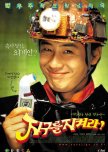
A Smart, Funny, Wildly Original Cult Classic
I can see why this flopped in Korea when it came out 20 years ago, just as I can see why it was a huge success on the American College circuit back then. Indeed, it still plays at some colleges due to its strong cult following. It appeals to a certain crowd because it's smart, funny, original and, finally, wildly creative in the way it criticizes how capitalism tramples on both human rights and environmentalism. More than anything, it's just plain weird. And that's its charm.The set up is pretty simple. A beekeeper thinks aliens are going to destroy the earth in 2 weeks during the lunar eclipse and that the alien leader hides among us disguised as the CEO of a vast chemical corporation. The beekeeper kidnaps the CEO and, together with his dimwitted girlfriend (who happens to be a circus tightrope walker), he commences to torture the CEO to glean information on how to save the planet from impending annihilation. The next 2 hours are a cat and mouse game between the beekeeper and the kidnapped CEO, while detectives search for them.
While one might think the film did not always succeed in tonal evenness because it vacillates between humor and violence, this was part of its brilliance. The viewer is not ever quite sure if they are supposed to be laughing at the hero for his ideas about aliens, alarmed by his violence, or sympathizing with him. But it's precisely this uncertainty that keeps us on our toes and gives an extra frisson to the viewing experience. We also don't know who to root for because as much as the CEO whom the hero kidnaps is a "victim" he is also the CEO of a chemical company notorious for polluting the environment. Moreover, he was shown in an early scene to be a rich jerk who stiffs poor working people like a cab driver. So we can't feel too much pity for this schmuck.
However, it's also hard to root for the hero because we simply are not certain of his sanity for most of the film. We don't find out if he's sane or not until the final 2 minutes. Keeping your viewer in doubt that long is a real risk, but the payoff was there when we got the answer at the end. I noted that some disliked the ending because it was simply too darn weird. But I see it as just one more of the film's riskier, wild, and out there twists. Besides, it afforded the single funniest line in the entire film when the guy said, "Of course I couldn't signal you, I had no hair!" You'll get the joke if/when you watch the film.
The film took a number of risks and nothing about it was formulaic. Indeed, I'd give it a 9.5 for sheer audaciousness alone. There must be others who agree, because Variety reported in February of 2024 that a Hollywood remake is in production with Emma Stone cast so far. I doubt it will be as good, so catch the original Korean version first.
Was this review helpful to you?

A Compilation of Images Adding Up to Nothing
A movie where even the pretentiousness is unoriginal. To wit: a woman who smuggles drugs looks mysterious in a cliched trench coat and sunglasses at night. Oh, and a ludicrous blonde, bouffant wig. Why does she wear that wig? No reason. The auteur director, Wong Kar-wai, just thought it was a cool visual. Hell, at the end of this segment another woman also wears a blonde bouffant wig. Why does she wear one? Well, because the first woman wore one.Blonde Bouffant Wig #1 kills the boyfriend of Blonde Bouffant Wig #2 who has something to do with her drug smuggling business. Why does she kill him? It seems a deal got botched, but really, who the hell knows. The movie does not trade in specifics. You see, specifics are for the vulgar, unwashed masses who want things to make sense. And our auteur director Wong Kar-wai does not make films for plebeians; he makes films for enlightened critics.
Earlier that evening Blonde Bouffant Wig #1 had bumped into a man who'd been jilted by his girlfriend, May. He eats canned pineapple with an expiration of May 1st because that's his birthday. And his girlfriend's name is May (golly, how clever of the screenwriter to have come up with this!) He eats canned pineapple every day for a month while waiting for his relationship with May to be resolved. He eats a lot of canned pineapples. He meets Blonde Bouffant Wig #1 at a bar and asks "Do you like pineapples?" as his pick up line.
This segment ends at 40 minutes. Since the director figured that was too short for a feature, he added another segment. There is certainly no organic reason for it.. The second movie is about a girl at a food stand who has a crush on a cop. He's been jilted too. She listens to the Beach Boys "California Dreaming" a lot. What is the significance of this? Nothing. But the director plays the song about a dozen times in the course of an hour (that's not hyperbole, the song literally plays every 5-10 minutes), and the excessive recurrence fools the audience into believing it's significant. Yet it's no more significant than the blonde bouffant wigs. Indeed, all that holds the movie's 2 segments together is that they both have random details posing as meaningful details. It seems to have fooled a lot of critics, who gush about this film.
It's just a compilation of images all of which add up to nothing, but empty imagery has always proven catnip for critics. You see, to use lots of nifty terminology such as "non-linear narrative." What does non-linear narrative mean, you ask? Why, it's code for "has no plot" because the director/screenwriter does not know how to construct one. Many say the movie is about loneliness, or about people getting jilted, or about modern, urban relationships. Those are pretty wide open labels that fit thousands of other films. The fact is, this auteur director has not given us any particular plot or theme. He simply knows how to shoot images. Lots and lots of images.
Was this review helpful to you?

Lot of Guns, Blood, and Killing and an Utterly Lazy Plot
To begin, the Japanese authorities wiped out the Yakuzas years ago, just as the FBI wiped out the Italian Mafia years ago. But the Japanese film industry keeps making Yakuza movies like this just as Hollywood keeps making Mafia films as if it were the era of The Godfather. That's fine, I don't mind a movie with fantasy images of the Mafia or the Yakuza. But for god's sake, give us a plot. This was just a lot of guns, blood, fighting and killing and a plot that made no freaking sense.The plot gives us an undercover cop who infiltrated the Yakuza, and he's portrayed as a mad dog on a quest to kill everyone who wronged innocents in the past. His motive is played as a big secret throughout the film, and when it's finally revealed, wow, what a big nothing. As for the undercover bit, well, I don't want to give spoilers, but when a film keeps revealing this one and that one in the Yakuza to also be an undercover cop, the dramatic tension is reduced to nil. After all, none of them are risking anything when they've essentially got half the police force undercover to protect each other. I groaned at the first revelation that a Yakuza was actually an undercover cop, groaned at the second revelation, and began to laugh as the number of undercover cops kept mounting. Half the cast end up being undercover cops. In short, this is a bad film. But hey, there are lots of hot men. At a certain point, that's the only reason I kept watching.
Was this review helpful to you?
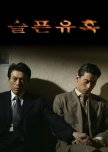
More Than a Love Story, It's About the Meaning of Love Itself
I was amazed that they made this in 1999 (ie, 25 years ago), when Korea is still so homophobic to this day. Not only that, but it was made for TV, and not a feature film. TV is always more conservative because it serves a general audience while theaters restrict the audience based on age. This makes it all the more stunning -- and impressive -- that "Sad Temptation" aired on Korean TV a quarter of a century ago.Given all this, I did not expect to see any physical contact between the leads, and was duly pleased with the one, small kiss that they did include. But what really makes the movie special is how it conveyed the men's love without physical, sexual expressions and, instead, used dialogue, eye contact, and subtle gestures to do the trick. The subway scene, for example, was so powerful that it did not even require dialogue, let alone physical touch, to portray that these men were in love.
These two men did not need to say one word out loud because they had a silent understanding that they were going to miss their stops and ride the subway to the end of the line to go to the beach. The ability to share a silent understanding with someone is a powerful testament of true love. It requires top notch acting to convey such love without any dialogue or physical contact, and these two actors were absolutely up to the task, thereby giving us splendid performances.
Now, I must confess that the leads' age difference gave me pause in my first viewing. These guys are over 30 years apart. The young one is about 25 and the older one is about 55. To me, the age disparity would've presented a bigger conflict than being the same gender. There are cultural issues when people are from different generations as these 2 men are. Then, of course, there is the issue of physical attraction (ie, people lose sexual desirability as they age).
But when I watched the movie a 2nd time, I came to the conclusion that the older man had such depth in his character that a hot-as-hell young guy could genuinely be attracted to his character, if not his looks. Moreover, the young one says he is attracted to the older one's vulnerability, and this is believable because the actor playing the older one truly does convey vulnerability -- something only an accomplished actor can do.
Overall, it was the excellence of the actors that made this movie work. The performances were deeply effective, causing me to not only care about the characters while I watched, but to continue thinking about them long after the movie credits rolled. Which is to say, it's a movie with true emotional resonance.
One reason for that resonance is that it's not strictly about homosexual love, but about all human love. It asks the viewer to examine the essence of love itself, and confronts us with the fact that love is not some fluffy, feel good extra in life but, rather, the very sustenance of life -- without which we cannot survive. This theme is expressed with a piece of dialogue in the climactic scene where the younger lead asks his beloved, "If a person can't love someone else, then how can they live in this difficult world?"
This is the sort of dialogue that could easily come off as a glib one liner in a movie where the characters have not earned the audience's respect. The beauty of "Sad Temptation" is that by time this dialogue arrives, the audience is not only emotionally invested in the characters, but takes the characters seriously on an intellectual level as well.
Highly recommended.
Was this review helpful to you?

A Wannabe Tarantino Movie That Fails Even as a Copycat
It started off well enough, and since the actors were all such pros I was invested in the characters. Alas, midway it descended into a wannabe Tarantino film replete with an R&B song blasting while two sexy, young hipsters shoot up a room full of dozens of people. But in a Tarantino movie the violence is aesthetically stylish. In this movie it came off as just plain silly.Some of the silliness involved a petite 90 pound girl who was bashed in the head with a hammer 6 times but did not die; and later in the movie was shot in the chest 3 times, but still did not die. I began to think of her as "The Immortal Femme Fatale." And that's just one of the film's sillier elements. Trust me, there are bucket loads more.
But of all the silliness, I'd have to say that worst involved the director's attempt to copy certain plot lines from "Reservoir Dogs" and certain scenes from "Pulp Fiction." The imitation was so lame that I began to feel embarrassed for this director. Really, by the end of this movie I was just plain cringing.
Was this review helpful to you?

This review may contain spoilers
An Intense Movie About Moral Gray Zones
Dog Bite Dog is a movie wherein we see a hitman kill 9 people including his mark, cops and a number of innocent bystanders. Watching him butcher so many people, I would hate him in one moment, and then see him with his love interest and suddenly want him to live so that he could redeem himself by loving her.He wasn’t used to feeling anything at all, let alone love. This was a person who’d grown up scavenging for discarded food at a landfill in Cambodia. As for landfills, it fascinating that he chose another landfill in Hong Kong to seek refuge after almost getting caught by the cops. He didn’t go to some nice park to unwind. Nope, he chose a landfill! That is what spoke of familiarity and home to this guy. I also noted that when the hitman fought with the cop, Wai, at the landfill he was biting Wai’s shoulder. The director was portraying him as a wild dog biting and chewing on human flesh.
Indeed, he was one of the Dogs in the title, “Dog Bites Dog.” The cop, Wai, was the other dog. Sure, Wai wasn’t as murderous as the hitman at first, but the signs were there that he was on his way to becoming so. Dang, he was breaking laws everywhere right from the start. He was constantly beating the shit out of witnesses. He gave drugs to informants in exchange for info. Presumably, Wai got those drugs from the police evidence room where cops keep drugs they take off drug dealers. Or he bought the drugs from dealers on the street. Either way, he got them illegally.
Overall, Wai was portrayed as violent, unruly and unethical. But he still had a father, his partner and colleagues he cared for, and they all humanized him. By the end he has lost all of them – and is now as alone in the world as the hitman was at the start of the movie. Accordingly, Wai also loses all morality, so much so that he even stabs a pregnant woman to death. He has now become inhuman. That is to say, he is now the Wild Dog.
The hitman, meanwhile, has become human via love for his wife and the impending birth of his child. He now has the family that Wai lost – and lost because the hitman killed all of them except dad, who killed himself. One can justify Wai’s angry lust for revenge. What’s amazing is that even though Wai was justified in wanting to kill the hitman, I wanted the hitman to continue his life as fruit picker with his new wife and baby. It’s a testament to the movie’s brilliance at portraying moral gray zones that I could sympathize with a hitman I’d witnessed killing 9 people.
It was a risky move for the writers to ask us to sympathize with such a character. And that was what they were knowingly doing by creating his tender, loving relationship with the girl. The writer/director created this moral gray zone by depicting the hitman holding the girl's hand, helping her walk after she'd injured her foot,, feeding her and just being all around attentive. In short, he is in love. It’s not only his first romantic love, but his first experience with any kind of love at all. We know that he never had the love of a family because he had grown up with a scumbag fight club owner. We know this, in turn, because he called the scumbag “dad” and, moreover, the scumbag said that he’d picked the hitman up off the street as a kid like a “stray dog.”
The scumbag and other dead-eyed boy fighters were all the hitman had ever known in his empty, brutal world where the only goal was to fill his belly and sleep somewhere warm. So his first experience with love – an abstract, emotional need rather than a physical need – had to have hit him with the awesome power of a thousand storms. But love ain’t enough to save him when the cop Wai is on the trail.
The hitman gained a family right as Wai lost his family, such that it was now Wait’s turn to live in a violent, soulless world working at a fight club. He even got one of the number tattoos on his neck that designated orphaned males after Pol Pot's Cambodian holocaust, and thus he blended in with the real men of the Cambodian Lost Generation. In other words, he had traded places with the hitman both literally and figuratively. He had nothing to live for except revenge.. And he was going to get revenge, even if he had to die for it. Which, of course, he did at the end
Now, about the ending. Wow, cutting that baby out was so unexpected and original! I’ve never seen this in a movie before. I also LOVED the way the hitman held the infant up to the sky, as if offering his gratitude to the heavens for its birth. Then, man-oh-man, the very final shot of the infant’s fist rising up toward the sun outdid that with an even more powerful message of hope.
Was this review helpful to you?

A Charming Movie About Likeable Losers
The film is not a mass market, crowd pleaser because it has no major plot arc. It is, after all, about two slackers who just do handyman jobs. Thus, the pace is as meandering as their lives. But that is also it's charm. Because they are likeable losers and their conversations, antics and encounters with clients are all quite entertaining and funny. Moreover, it's endearing to observe them slowly -- and unwittingly -- develop a little bromance.The most wonderful thing, however, is how they also unwittingly change their clients' lives in tiny, tender, ways. And it surprises you with moments of depth, such as when one lead tells a neglected child that life doesn't always have to be so cold because, as he puts it, "You can give the love that you did not get. You can offer love to someone else as long as you are alive." There are also bits of warm wisdom, as when a minor character tells one of the leads, "You don't look too good. Remember, smiling is the door to heaven."
Many comments here compared it with the sequel, which was created as a 12 part series. The series stars the same two leads, but it's written and directed by a different person and, hence, the sensibility is quite different. The main difference is that the series has a lighter sensibility designed for broader appeal, while this has the sensibility of an Indy film. In other words, the series lacks the darker, deeper qualities of the original film. I still recommend the series, but the film is superior, and you should either choose the film over the series, or watch the film first.
After all, it is a film with an abundance of depth, tenderness, careful character development, brilliant chemistry between the leads, offbeat humor, and true heart. If the best a person can say of a film is that they were "moved by it," well, I must say that I was genuinely moved by this film.
Was this review helpful to you?

It's Got a Certain Hipster Nihilism, But It Works
Let it be said that "Tokyo Rampage" is largely about style. Now, this could easily mean that a movie is superficial. However, the style here is slickly appealing and, moreover, part of the movie's theme about socio-cultural vacuity. In short, it works.As for the story itself, there's a certain hipster nihilism which would -- just like the movie's surfeit stylishness -- seem a negative element. Yet, no, it's actually handled in a way that's purposeful and, hence, intriguing. Indeed, I enjoyed the ride because I had decided early on that the inscrutable, psychopathic lead's maddeningly repeated line, "Not needed," made him the homicidal cousin to Bartleby in Herman Melville's famous short story, "Bartleby the Scrivener." I am referring, of course, to the inscrutable Bartleby's maddeningly repeated line, "I prefer not to."
Like Bartleby, this character is a blank, and his mission to murder every "Not needed" person in his path does not make us hate him, because one cannot hate a blank space. Meanwhile, the audience is intended to empathize with the other lead, the psychopath's boss (the one sympathetic character in the whole movie), and for the boss the line, "Not needed" eventually begins to register as an existential crisis.
The viewer, just as the boss, begins to squirm under the same frustrating fear and bewilderment each time they hear the line, "Not needed." It's when you realize that you are just as effected by this line as he is that you also realize, son of a bitch, this bizarre, disturbing movie worked. In other words, it achieved precisely what it had set out to achieve.
Oh, and watch for the visuals -- such as the bathes of tomatoes, the swooping down of death crows, and the falling of knives. But especially the falling of the knives. That scene is worth the whole movie alone.
Was this review helpful to you?

Creepy, Disgusting People Do Creepy, Disgusting Things
A middle aged cop continually has sex with a 15 year old girl as they, um, "fall in love." We're supposed to accept that this is ok, and that it truly is "love" because the 15 yr old girl is weird as fuck and spouts gibberish about Chinese proverbs related to the Chinese symbol tattooed on the cop's back. But the film does nothing to denote any kind of love between the two, and the constant tattoo gibberish simply comes off as an excuse to show an old man diddling a little girl.Others in the town know about the affair and a cop at the precinct simply jokes to the main character cop, "So you've moved on from married women to school girls, huh?" The 15 yr old girl's grandfather (and her caretaker), not only approves of the relationship, but gives his blessing and asks the cop to take good care of his granddaughter after he dies. In other words, the affair is played as ok within the social context of the characters' world as another way of making the viewer accept it. Note to the director: it did not work. Because the viewer still does not accept it. Indeed, the viewer is still repulsed by this affair.
All of the characters are unrealistically weird, and have backstories of parents who are either suicidal or sexually abusive. The 15 year old girl's brother is mentally disabled and her grandfather is an undertaker. Her job is to put makeup on corpses, and we see her doing this a number of times. The movie is packed with such scenes that are designed to be meaningful but are, instead, simply disturbing. This makes it worse than pretentious, because even the pretentiousness falls flat. Ultimately, it's just a movie where creepy, disgusting people do creepy disgusting things.
Was this review helpful to you?

A Quirky Sensibility & Charming as Hell Characters!
This was made 23 years ago and, man, it still holds up! Heck, it even feels quite contemporary. For instance, there is a transgender character who is played as a perfectly normal person whom the main characters had known as a female child at school, but now accept as a male adult without missing a beat. They simply accept that the girl had surgery and is now a man, and move on to other issues as the story progresses in this episode (the trans person appears as a supporting character in ep 5).But it isn't just this character who feels contemporary, it's the sensibility of the entire show in general. This is achieved with a lot of fun, tricky camera work that keeps the narrative pulsing with a vibrant, visual appeal, as well as with the use of constant, witty dialogue. Indeed, the entire vibe of the show is fun in a quirky, original sort of way.
And the main characters are all highly charismatic and enormously likable. Yet it isn't just the main characters; because in this show, even the side characters draw you into the screen. It must be said that while each episode plays as a crime procedural with the main character setting out to solve a different crime, the real pleasure is not found in watching him solve the crimes, but in watching him and the rest of the cast be charming as hell.
Moreover, the actors playing these charming characters all do a wonderful job. In fact, a lot of the fun in this show is watching these actors 23 years ago before they became super famous in Japan. To wit: Ken Watanabe, Tomoya Nagasa, Yasuke Kubozuka and Issei Takahashi. There's a reason such fine actors all chose to be in this show, and that is because it has a terrific script, talented directors and exceptional cinematographers. In short, the show is a winner.
Was this review helpful to you?

This review may contain spoilers
Delightful 1st Half, But Plot Falls Apart in 2nd Half
The 1st half of "You Are the Apple of My Eye" was a sheer delight! The male lead's voiceover depicted his teen years with an authenticity that makes one feel an actual teenage wrote the dialogue. It has a fresh, goofy quality that is the very essence of youth. I was either smiling or laughing for every frame of the entire first half of the film. It had such innocence that even the masturbation jokes were bereft of the kind of vulgarity we get in Hollywood teen movies such as "American Pie." The Asians can hit this tone in a way that Hollywood cannot, because Hollywood only knows how to depict teen sexuality with vulgarity. The teens in this film did not even kiss on their dates. Hell, these teen characters felt that even holding hands on a date was a big deal.Observing these teens undergo the trials and tribulations of first love, overbearing teachers, college applications, and the pressures of making career choices, was handled with charm, humor, and a tender kind of nostalgia for those years. The script and director handled all of this deftly. Alas, the plot fell apart in the 2nd half.
To begin, in what universe does a beautiful girl (whom every boy chased throughout high school), choose to date a fat, dorky, unattractive, boring guy with glasses (whom she ignored all through high school), while rejecting a super sexy, well built, fun guy with tons of charisma (whom she'd paid tons of attention to all through high school)? ANSWER: none.
Oh, and then she ends up marrying an old, dull looking man instead of the young, super sexy dude who's her own age; who's been chasing her for years; and whom the entire movie had portrayed as The One. Why bother portraying a sexy male lead as The One if you're going to have the female lead first date a fat guy, and then marry an old guy? But what really killed the movie was the montage at the very end (during the wedding scene), that revealed how the female lead had loved the male lead just as much as he loved her the whole time. She even told her BFF on high school graduation day that she wanted him to confess his love to her. Umm, he did. Dozens of times! So why did she continually reject him when he did?
I think the screenwriter must have somehow forgotten that he'd written this bit about girl telling her BFF she wanted the boy to confess to her. Because when he did confess, she had plenty of opportunities to reciprocate his love. I mean, daily opportunities. Christ, he was telephoning her daily from his college dorm and declaring his love constantly. Yet she responded to his constant declarations by refusing to date him. Hell, the movie even made it clear that she never so much as held his hand. And then, on the rebound after a fight, she proceeded to date the fat kid with glasses for a couple of years and held HIS hand. Then, years later, she marries the older man.
These two plot points made no sense and ruined what had started out as such a fun, charming movie. Really, I'd give the first half a 10 because it was so delightful, and then it totally fell apart in the second half, to which I'd give a 3. And that was only because the male lead was so damned likeable. He was so watchable that I stared at every frame in which he appeared despite the second half's plot making no sense. In total, my rating of a10 for the first half and a 3 for the second half, gives my rating an average of 6.5.
Was this review helpful to you?

Funny, Original, and Excellently Performed
I'm no fan of Sion Sono, and find most of his stuff to be overly stylized, overly long, bombastic explosions of an Auteur Director who takes himself far too seriously. Which is why I was so surprised by how this movie not only pokes fun of such directors, but does such a spanking good job of it.It is a brilliantly funny, original, and excellently performed movie about a guerilla group of filmmakers called "The Fuck Bombers" who are making, yep, a movie. Meaning, we get a movie within a movie. And since they are filming a real life Yakuza war, this means they get down with gangsters in the actual act of killing each other; hence, portraying how The Fuck Bombers will die for their art.
It is Sion Sono's meta movie with in-jokes on the nature of making movies, and the obsessives who make them.
Was this review helpful to you?
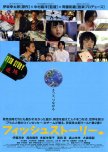
A Punk Rock Band Saves the World!
"Fish Story" is about a punk rock band who unwittingly wrote a song that would save the world decades after they split up -- and split up because that very song, and the album on which it appeared, were utter flops. Hence, it's not merely a movie about a punk rock band who saved the world, but a FAILED punk rock band who saved the world! And the movie is just as clever, witty, and fun as that premise would lead you to expect. Hell, there's a reason this movie lands on so many different critics' lists for, "The 100 Best Japanese Movies of All Time." The reason is that it is perfection.Consider the opening scene, which depicts a meteor on its way to destroy the earth in a couple of hours. Corporate buildings are deserted; cars abandoned in the middle of the street; and litter strewn everywhere in the wake of a public panic. It's an apocalyptic scene of the sort we got in Stephen King's horror-fantasy, "The Stand." Only we quickly learn that unlike "The Stand," this apocalyptic plot is comedic.
Because there, in a vintage record store, two dudes are blithely unconcerned with the comet hurtling toward planet earth preferring, instead, to discuss why a particular band qualifies as authentic punk rock. It's funny as hell because it evokes how society ridicules certain communities with the aphorism: "Those people think such-and-such is more important than the end of the world!" Well, music nerds truly do think a precise distinction between "rock" and "punk rock" is more important than the end of the world. And so it is that with this we have a perfect opening scene that aptly sets the tone for what continues to be a perfect movie every second of its duration.
Now, one must be patient, because it's one of those movies wherein multiple narrative threads with multiple sets of characters from different eras are being woven together as we go; and you won't recognize just how intricately they'd been woven until the very end. But you'll have fun with the characters and the dialogue even when you don't know how the hell these various narrative threads can possibly come together. Then, man-oh-man, when they do come together you'll find it was well worth the wait. Indeed, it was spectacular!
Was this review helpful to you?
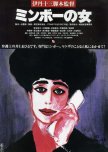
Minbo: The Gentle Art of Japanese Extortion
0 people found this review helpful
Fun Comedy Showing How the Yakuza Are Truly Just Thuggish Fools!
This was a very famous movie in Japan in 1992 because the Yakuza were so pissed about being portrayed as bullies and fools that a couple of them stabbed the director 3 days after the movie's release. He survived and wore his scars as a badge of honor. The idiot Yakuza thugs did not get that stabbing a director would inadvertently create media attention to make the movie 10x's more popular. In short, it became a hit! The stabbing also caused a public uproar that resulted in the law enforcement coming down harder on the Yakuza at the time.As for the movie itself, it's a comedy, so the portrayal of the Yukuza's menace is handled lightly. But beneath that it's also an interesting expose on how the Yakuza truly were blackmailing and extorting regular citizens in the 90's because the law had cracked down on gambling, drugs and prostitution, leaving the Yakuza with few ways to earn other than by extorting regular people and their businesses.
The movie portrays this by showing how the Yakuza are extorting and blackmailing one particular hotel, and how one delightfully brave woman lawyer beats them. The actress playing the lawyer puts in a terrific performance as a smart, funny, sarcastic person who is, at the beginning, the only one brave enough to face down the Yakuza. The Yakuza are appalled that a "little lady" can dare be so fearless! Their sexism is hilarious.
She plays her role with a lot of charm, humor and wit and really makes the movie. The actors portraying the hotel staff also do a great job as bumbling men who are, at first, afraid of the Yakuza, but soon grow brave under the lawyer's tutelage. In all, it's a fun little comedy that also gives insight on how the Yakuza truly were behaving at the time.
Was this review helpful to you?

 1
1


















